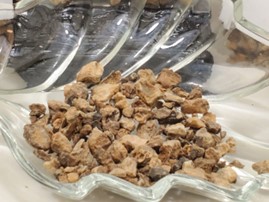Devil's Claw
Metaphysical Properties Of Devil's Claw
Official Name: Harpagophytum spp.
Other Names: Grapple Plant, Wood Spider, Unicorn Plant
Gender: Feminine
Planet: Saturn
Element: Earth
Deities: Tzaddi (Fish Hook), Isis, Athena, Shiva
Metaphysical Powers: Protection, Exorcism, Purification, Banishing, Hex Breaking
Common Magickal Uses and Folklore of Devil's Claw
Many plants carry the common name of Devil's Claw, but this one deserves some special attention. Harpagophytum procumbens is a traditional medicinal plant of the San people who live in the Kalahari Desert. Devil's Claw is a perennial desert plant. It is a warrior plant that grows explicitly in the ground that has been degraded and abused by overgrazing. It protects the ground from further assault utilizing its fearsome seeds with their tenacious hooks from which it derived its name. The seeds hook onto the hoofs or mouths of grazing animals, which quite immobilizes the unfortunate animals, and they may become unable to carry on grazing - an effective deterrent in the plant's effort to protect fragile lands. Devils Claw produces a deep taproot and a tuberous secondary root, which becomes very swollen and fleshy. This is the part which the San collect for medicine. In 1950, Western researchers found out about the remarkable properties of this plant and started to market it in the West. To cut an old and familiar tale short - today, Devil's Claw is becoming rare. Of the three countries in which it is found, Namibia, Botswana, and South Africa are endangered in two. The tragedy is that untrained harvesters collect the tuber and the root, thus killing the plant for good. Deserts are fragile environments, and desert plants are particularly at risk. In recent years awareness regarding the damaging effects of unsustainable harvesting methods has grown considerably, and there are now some efforts to grow and harvest this root sustainably.
Traditional Herbalism Uses of Devil's Claw
In Western herbalism, this root application is limited to the treatment of arthritic joints, rheumatoid aches, pains, and lower back pain. However, it must be said that this is not a magic bullet. It allies chronic rather than acute pain, and relief is felt after taking the extract for some time. This may partly be because the anti-inflammatory compound (iridoid glycosides) is rendered less effective by interacting with the stomach acid. Some studies suggest that injections to the affected area are more effective than tea. Traditional healers have a far greater spectrum of use for this plant, including anorexia, indigestion, diabetes mellitus, hypertension, gout, fevers, skin cancer, infectious diseases (including tuberculosis), allergies, osteoarthritis, fibrositis, and rheumatism, being particularly effective in minor joint conditions (Van Wyk and Gericke, 2000). Externally it is also used to wash wounds. When taken on a regular daily basis, it has a subtle laxative effect. Small doses of the plant's root extract are used for menstrual cramps, while higher doses assist in expelling retained placentas. Devils Claw is also used as an analgesic after childbirth and to keep the uterus contracted. Its extreme bitterness explains its actions on the digestive system. Its effects on the uterine system have been investigated and verified in laboratory studies.
Magical uses of Devil's Claw
Nothing has been written about the magical uses of this herb. However, it has powerful protective qualities, and as an amulet placed near doorways, it may protect against unwanted intruders. Do not use it during pregnancy.





